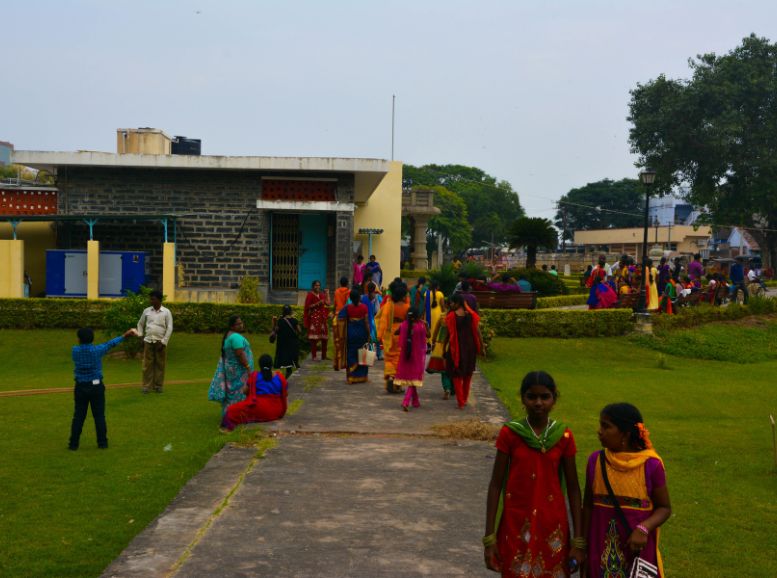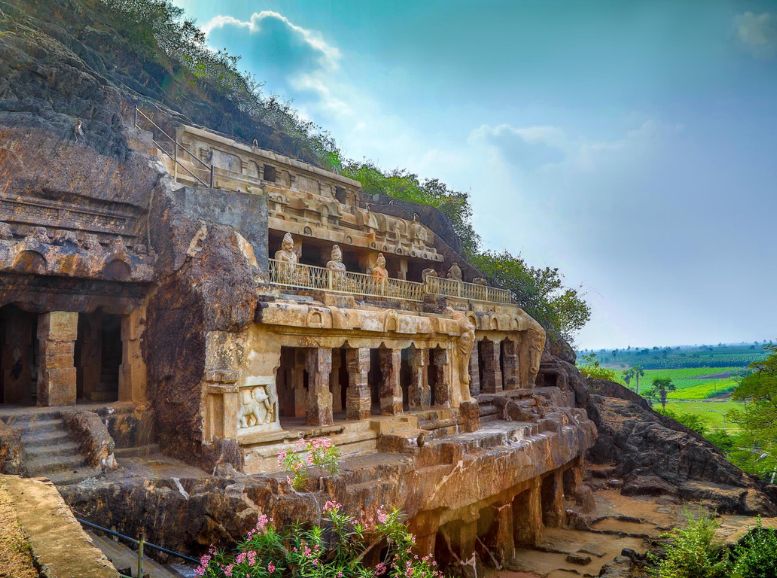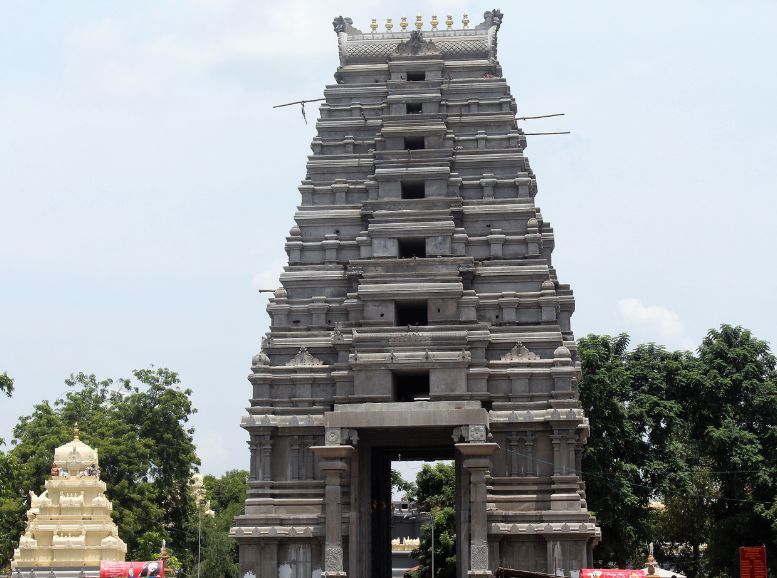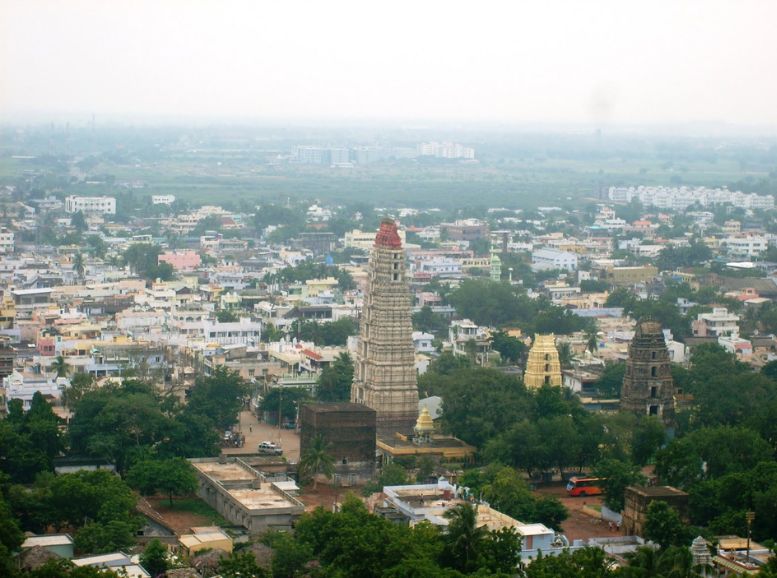Unveil the captivating city of Amaravati, where history whispers from ancient stones and spirituality permeates the air. Nestled on the banks of the Krishna River, the lifeblood of Andhra Pradesh, Amaravati boasts a rich tapestry of heritage and contemporary vibrancy. This city, once the seat of the Satavahana dynasty and a celebrated Buddhist center, holds a place of prominence in India’s illustrious past.
Amaravati’s enchantment transcends its historical significance. It offers a haven of tranquility and spiritual energy. Explore magnificent Buddhist stupas and serene temples, lose yourself amidst lush landscapes, or delve into the vibrant hum of local markets. Here, the ancient and modern seamlessly blend, captivating your senses and leaving you spellbound.
How to reach:
Soaring In:
- Vijayawada Airport (VGA): Your closest air link, also known as Gannavaram Airport, sits about 30 kilometers from Amaravati. Major Indian cities like Delhi, Mumbai, Bangalore, and Chennai have frequent flights to Vijayawada. Upon arrival, taxis and buses are readily available to whisk you to Amaravati.
Railway Routes:
- Vijayawada Junction (BZA): Since Amaravati lacks its own railway station, Vijayawada Junction becomes your key connection. It boasts excellent connectivity to various Indian cities. Taxis and local buses are your options for the final leg to Amaravati, with a travel time of 45 minutes to an hour depending on traffic.
Road Trip Ready:
- Hitting the Highway: Amaravati is well-connected by road, making it accessible by bus, car, or private vehicle. National Highway 16 (formerly NH-5) conveniently runs through the city, linking it to major hubs like Vijayawada, Hyderabad, and Visakhapatnam. State-run and private buses offer regular services to and from Amaravati.
- Scenic Self-Drive: For those with a car, the road journey to Amaravati promises picturesque countryside views. This option provides flexibility for those who like to control their travel pace.
Exploring the City:
- Local Connections: Once in Amaravati, navigating the city is a breeze. Auto-rickshaws and cycle-rickshaws are popular choices for short distances. Taxis and rental cars cater to those seeking more comfort. Additionally, Amaravati boasts a well-developed city bus network, connecting various areas and allowing travelers to explore its hidden gems.
Best time to visit:
Winter (October – February):
Embrace Amaravati at its most inviting during the winter months. From October to February, the weather transforms into a haven of pleasant coolness, perfect for exploring the city’s outdoors and historical sites. Imagine comfortable temperatures ranging from 15°C to 25°C, a welcome respite from the scorching summer sun
Spring(March – May):
Spring whispers the arrival of summer in Amaravati. While the weather warms up, with temperatures between 25°C and 35°C, it remains a favorable time to visit, especially if you don’t mind a bit of heat. Embrace the opportunity to explore outdoor gems like parks, gardens, and historical sites.
Monsoon (June – September):
June to September paints Amaravati with the vibrant hues of the monsoon season. Witness the landscape rejuvenate with lush greenery, creating a picturesque backdrop. However, heavy rainfall might disrupt outdoor activities and sightseeing. Additionally, humidity levels rise significantly, impacting comfort levels. If you enjoy the monsoon’s charm and don’t mind occasional showers, Amaravati can still be a captivating destination during this season.
Attractions:
Amaravati Stupa:

Amaravati’s crown jewel, the Amaravati Stupa (Mahachaitya Stupa), is a must for any visitor. This architectural marvel, dating back to the 3rd century BCE, stands proudly as a testament to the region’s ancient Buddhist heritage. Perched atop a hill, it offers panoramic vistas of the surrounding landscape. One of the oldest and largest stupas in India, it draws in pilgrims and history enthusiasts alike. Intricate carvings and sculptures adorning the stupa depict scenes from the life of Buddha, creating a serene atmosphere perfect for reflection. Complementing this marvel is the adjoining museum, which houses a treasure trove of artifacts and relics unearthed from the site. These remnants offer invaluable insights into Amaravati’s past as a thriving Buddhist center.pen_sparktunesharemore_vert
Amaravati Archaeological Museum:

A pilgrimage to Amaravati wouldn’t be complete without experiencing the Amareswara Temple. Dedicated to Lord Shiva in the form of Amareswara, this grand structure is steeped in mythology and architectural marvels. Tucked away amidst verdant greenery, the towering gateways (gopurams) and intricate sculptures create a captivating atmosphere, leaving visitors in awe of its divine splendor. Legends whisper of Lord Shiva himself manifesting as a lingam at this sacred site, offering blessings to devotees and seekers of truth.
The temple complex pulsates with piety and devotion. Devotees from all corners journey here seeking solace and spiritual enlightenment. As the rhythmic chants of priests resonate through the air and the fragrance of incense fills the corridors, visitors are transported to a realm of tranquility and transcendent beauty
Undavalli Caves:

Tucked away in a picturesque setting lie the Undavalli Caves, a testament to the artistic mastery and architectural prowess of ancient India. Carved between the 4th and 5th centuries CE, these rock-cut caves are a fascinating blend of Buddhist and Hindu styles, reflecting the rich cultural tapestry of the era.
Hewn from solid sandstone, the caves boast intricate pillars, magnificent sculptures, and exquisite reliefs that weave tales from mythology. The heart of the complex houses a colossal reclining statue of Lord Vishnu, embellished with intricate carvings and captivating motifs. As you delve into the labyrinthine chambers and halls, prepare to be transported back in time to an era brimming with artistic brilliance and spiritual devotion.
Amareswara Temple:

A pilgrimage to Amaravati must include the Amareswara Temple, a sacred site dedicated to Lord Shiva. Steeped in mythology and architectural grandeur, the temple sits nestled amidst vibrant greenery. Towering gateways (gopurams) and intricate sculptures create a captivating atmosphere, leaving visitors in awe of its divine beauty. Legend tells of Lord Shiva manifesting himself as a lingam here, a sacred symbol, offering blessings to devotees and those seeking spiritual truth.
The temple complex pulsates with piety and devotion. Devotees from all corners journey here seeking solace and spiritual enlightenment. As rhythmic chants of priests resonate through the air and the sweet fragrance of incense fills the corridors, visitors are transported to a realm of tranquility and profound beauty.
Mangalagiri:

Just outside Amaravati’s bustling center lies Mangalagiri, a charming town brimming with history and religious significance. Atop a scenic hill, the ancient Narasimha Swamy Temple reigns supreme. Legend whispers of its construction by the sage Parashurama, imbuing it with deep mythological importance. Visitors embark on a spiritual climb, ascending the 500 steps to reach the temple, greeted by an atmosphere of serenity and divine grace. The summit rewards them with panoramic vistas – the surrounding plains unfurl, meeting the Krishna River in a display of timeless beauty.
Mangalagiri boasts another treasure: its handloom sarees. Renowned for their unique weave and vibrant colors, these “Mangalagiri sarees” are prized possessions. Delve into the town’s markets and witness the age-old craft of handloom weaving firsthand. Immerse yourself in the rich tapestry of Mangalagiri’s cultural heritage, taking home a piece of its history and artistry.
Local Experiences:
- Meditate with the Masters: Join guided meditation sessions led by local monks and delve into the ancient practice of mindfulness.
- Find Tranquility in Lush Gardens: Explore serene meditation gardens, perfect for quiet contemplation and inner reflection.
- Mangalagiri Masterclass: Learn the art of handloom weaving from local artisans in Mangalagiri.
- Woven Souvenirs: Create your very own handwoven masterpiece, a unique souvenir to cherish your Amaravati experience.
- A Taste of Andhra: Savor authentic Andhra cuisine at local eateries. Try the iconic Hyderabadi Biryani or the tangy Gongura Pachadi.
- Street Food Delights: Explore the vibrant street food scene and indulge in crispy Mirchi Bajji or melt-in-your-mouth Bandar Laddu.
- Heritage Walks: Embark on heritage walks through Amaravati’s quaint neighborhoods, lined with centuries-old houses and temples.
- Living History: Engage with local residents to gain insights into Amaravati’s rich history and vibrant culture.
- Sunset Cruises: Set sail on scenic river cruises along the Krishna River, offering picturesque views of Amaravati’s landscape.
- Witness Majestic Sunsets: Marvel at breathtaking sunsets as they paint the sky with vibrant hues, casting their glow on iconic landmarks like the Prakasam Barrage.
- Cultural Extravaganza: Witness traditional music and dance performances that showcase the captivating cultural heritage of Andhra Pradesh.
- Festival Feasts: Immerse yourself in the vibrant energy of local festivals, filled with music, dance, and delicious local cuisine.
Travel tips:
- Cultural Sensitivity: Familiarize yourself with this place’s customs and traditions before your visit. Dress modestly at religious sites, and seek permission for photos, especially in sacred areas.
- Hydration & Sun Protection: This place’s weather can be hot. Pack a water bottle and wear sunscreen, sunglasses, and a hat to shield yourself from the sun.
- Plan Your Visits: Popular attractions like the Stupa and Amareswara Temple can get crowded, especially on weekends and holidays. Opt for weekdays or early mornings to avoid large crowds and long lines.
- Market Magic: Bargaining is a common practice in Amaravati’s markets like Kaleswara Rao Market. Haggle politely and respectfully, keeping fair prices in mind.
- Travel Savvy: Be mindful of your belongings, particularly in crowded areas. Use a crossbody bag or money belt and avoid displaying valuables openly.
- Culinary Caution: While Amaravati boasts delicious local cuisine, approach street food with care to avoid stomach issues. Opt for freshly prepared dishes from reputable eateries and avoid uncooked or unhygienic options.
- Reliable Rides: Choose reliable transportation like registered taxis, auto-rickshaws, or app-based cab services. Confirm fares beforehand, and ensure vehicles have working meters or negotiate fares before your trip.
- Sustainable Travel: Help preserve Amaravati’s beauty by disposing of waste responsibly and avoiding littering. Stick to designated trails when exploring nature areas, and refrain from damaging wildlife or vegetation.
- Festival Fun: Check local calendars for festivals or cultural events during your visit. Participating offers a window into the local way of life.
- Ask the Locals: Don’t hesitate to seek advice or recommendations from locals about places to visit, eat, or stay. They can provide valuable insights to enhance your Amaravati experience.
Conclusion
Amaravati, Andhra Pradesh, is an immersion into a world rich with cultural heritage, spiritual peace, and timeless beauty. The ancient majesty of the Amaravati Stupa and the picturesque landscapes along the Krishna River whisper tales of a vibrant past and a promising future. Whether you find solace in meditation, tantalize your taste buds with delectable Andhra cuisine, or lose yourself in the rhythmic beats of local festivals, Amaravati offers experiences that resonate with the soul. As you depart, may your memories be filled with the sights, sounds, and sensations of this captivating city, leaving you with a deep appreciation for its enduring charm and a yearning to return for further exploration.
Craft the perfect Amaravati itinerary with Xplro.com. Explore hidden gems, delve into cultural experiences, and let Xploro be your trusted companion as you discover the captivating embrace of Amaravati.
FAQs
- What is the suggested time to visit Amaravati?
- The ideal time to explore this place is during the winter season, spanning from October to February. The weather is pleasant, making it perfect for outdoor activities and sightseeing.
- How can I get to Amaravati?
- Amaravati is accessible by air through Vijayawada Airport, by train via Vijayawada Junction, and by road via well-connected highways.
- What are the must-visit attractions in Amaravati?
- Key attractions include the ancient Stupa, the Amaravati Archaeological Museum, the Dhyana Buddha Statue, and the captivating Undavalli Caves.
- What makes the Amaravati Stupa significant?
- Dating back to the 3rd century BCE, the Amaravati Stupa is an emblem of ancient Buddhist heritage, renowned for its intricate carvings and historical prominence as a pilgrimage site.
- Are there outdoor activities available in Amaravati?
- Certainly, visitors can indulge in outdoor adventures like scenic river cruises on the Krishna River, trekking in nearby hills, and exploring Bhavani Island’s lush greenery.
- What local cuisines should I try in Amaravati?
- This place offers a rich culinary tapestry with specialties like Hyderabadi Biryani, Gongura Pachadi, Pesarattu Dosa, and the spicy Mirchi Bajji.
- Are there cultural festivals celebrated in Amaravati?
- Indeed, Athis place celebrates festivals such as Ugadi, Diwali, and Krishna Pushkaralu with gusto, providing visitors with an immersive cultural experience.
- What are the shopping options in Amaravati?
- Shoppers can explore bustling markets like Besant Road, Kaleswara Rao Market, and Gandhi Nagar Market for a variety of clothing, spices, and handicrafts.
- Is solo travel safe in Amaravati?
- Yes, solo travel at this place is generally safe. However, travelers should exercise standard precautions such as safeguarding belongings and staying cautious in unfamiliar areas.
- What adventure activities are available in Amaravati?
- Adventure enthusiasts can enjoy activities such as boating, water sports, and bird watching at scenic spots like Bhavani Island and Kolleru Lake.
- What languages are commonly spoken in Amaravati?
- The primary language spoken here is Telugu. However, English and Hindi are also widely understood and spoken in tourist areas.
- Are there eco-conscious lodging options available in Amaravati?
- Absolutely, this place offers eco-friendly accommodations committed to sustainability, including eco-resorts and lodges focused on minimizing environmental impact.





